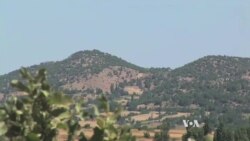Efforts by the Turkish government to end a decade-long insurgency by Kurdish rebels is under threat, as controversial military construction projects across Turkey's predominantly Kurdish southeast have been causing violent protests as peace efforts remain stalled.
Lice, in southeast Turkey, is where the first shots were fired thirty years ago in the conflict between the Kurdish rebel group the PKK and the Turkish state. But peace returned to these lands with a government initiated peace process with the rebels. Now that process is under threat. Too afraid to give his full name, Ahmet showed me where, earlier this month, a peaceful protest against the building of a nearby military outpost turned fatal.
Protesters were demonstrating against the new military bases and dams. People came here for a democratic protest but they were shot, said Ahmet.
Two people died that day. The deaths caused outrage among many Kurds and demonstrations turned violent in towns and cities across the region. Several soldiers are now under investigation for the shootings.
The killings have put under scrutiny the building of large, sophisticated military bases across the predominantly Kurdish region. According to state figures, 114 have been already been built and 166 are under construction.
Protests are continuing, and with the peace process stalled, some Kurdish rights activists are increasingly questioning the sincerity of the government.
These military bases are a place for death, one activist said. It is a place of evil, not of goodness. If Prime Minister Recep Tayyip Erdogan wants our well-being and loves us, why isn't he building factories, hospitals and schools here, the activist wondered.
But the ruling AK Party is conversely questioning the intentions of the PKK, accusing the rebels of taking advantage of peace
Fatma Oncu, a member of AK Party's national committee, defends the military building program. In many places the bases, she said, the bases are only being renewed, and the program is not about creating a war situation. Oncu also pointed out that the first condition of the peace agreement was that the guerrillas be disarmed and move outside the country's borders, but not even 20 percent of the PKK militants have done so.
In a surprise move Thursday, Prime Minister Erdogan introduced into parliament legislation aimed at enhancing the peace process. It legalizes the peace process and opens the door for the release of ailing PKK prisoners -- key demands of the rebel group. Observers say the legislation is well timed, given that the patience of many Kurds appears to be wearing out.
The future of the military building program is seen as an important test of the government's commitment to peace. Sirri Sureyya Onder, a parliamentary deputy with the pro-Kurdish HDP party, is a key participant in the current peace efforts. He says the military construction program has to end.
Asking for peace and then building military bases is the biggest contradiction in the world, he said. There are thousands of things to be done socially, culturally and economically in the region, and starting by building military precincts sends the wrong message.
Addressing a mass demonstration earlier this month in Diyarbakir, the main city in Turkey's predominantly Kurdish southeast, Onder promised that if the peace process continues, PKK leader Abdullah Ocalan, who is being held in a Turkish prison, would be freed next year to address them there.
Observers say that hope remains the most powerful force keeping the Kurds committed to the peace process.





